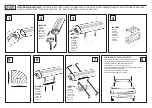
Jump-starting
¤
Introduction
In this section you’ll find information about:
Using jumper cables
If your engine does not start because the vehicle battery is dead, your vehicle's battery can be
connected to the battery of another vehicle to start your engine (jump-starting). Check the battery acid
level indicator on the vehicle battery before jump-starting
⇒
page 293,
Vehicle battery
.
You must use jumper cables that meet recognized industrial standards (check information provided by
the jumper cable manufacturer). For vehicles with
gasoline engines
, the cross-section of the jumper
cable wire must be at least 0.038 in.
2
(25 mm
2
), or about 3 ga. (AWG). For vehicles with
diesel
engines
, the cross-section must be at least 0.054 in
2
(35 mm
2
), or about 2 ga. (AWG).
More information:
x
Starting assistance systems
x
Working in the engine compartment
x
Vehicle battery
WARNING
Working on the batteries or the electrical system in your vehicle can cause serious acid
burns, fires, or electrical shock.
x
Always keep children away from battery acid and vehicle batteries in general.
x
Sulfuric battery acid is very corrosive and can cause blindness and damage to
unprotected skin. Never let battery acid or lead particles contact your eyes, skin, and
clothing.
x
Never lean over a vehicle battery. Always wear protective gloves and eye protection. To
reduce your risk of injury, never tilt the batteries; acid could spill out through the vents and
burn you.
x
A highly explosive mixture of gases is given off when the battery is being charged.
x
Always avoid fires, sparks, open flame, and smoking. Never create sparks or electrostatic
charges when handling cables and electrical equipment. Never short-circuit the battery
terminals. High-energy sparks can cause serious personal injury.
x
If you get battery acid in your eyes or on your skin, immediately rinse with cold water for
several minutes and get medical attention immediately. If you swallow any battery acid, get
medical attention immediately.














































